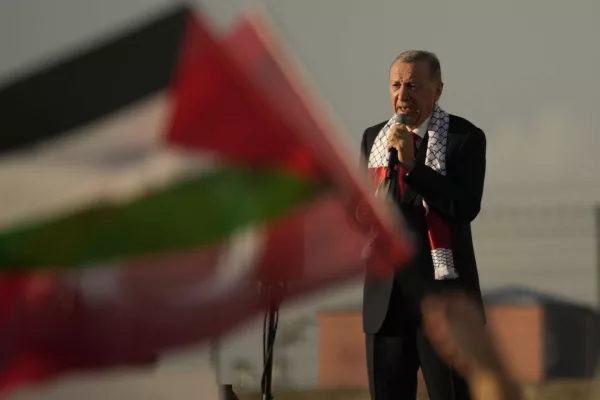This article will focus on Turkey’s foreign policy actions in the context of the Middle Eastern crisis, given its role as a significant regional player with a demonstrated ability to mediate other regional conflicts. A prominent example of Turkish mediation is evident in the Russia-Ukraine conflict. However, the unique aspect of Turkey’s position in the Palestine-Israel conflict adds a particularly interesting dimension.
In the first days after the start of the conflict, Turkish President Recep Tayyip Erdoğan called on Israelis and Palestinians to refrain from hostile actions that could exacerbate the situation. Moreover, he declared Ankara’s readiness to try to stop the fighting. The Turkish leader believed that peace in the Middle East could only be achieved through the establishment of the state of Palestine within the 1967 borders. According to Erdoğan, an independent state of Palestine with geographic integrity and a capital in eastern Jerusalem is “a necessity that cannot be delayed.“
It is important to clarify that Turkey’s current stance in the conflict between Russia and Ukraine is not unprecedented. Following Russia’s full-scale invasion of Ukraine in February 2022, Turkey maintained communication with both Russian and Ukrainian leadership. Notably, Turkey played a pivotal role in brokering the Black Sea grain deal between Russia and Ukraine (later rescinded by Russia in July 2023). Turkey successfully navigates its relationships with both Russia and Ukraine while simultaneously maintaining “normal” ties with the Western nations.
The significance of Turkey’s relationship with the neighboring Russian Federation was underscored by Turkey’s Foreign Minister during the Ambassadors’ Conference in August 2018. He emphasized that the ties with Russia remain a fundamental element of Turkey’s foreign policy. This strategic alliance with Russia serves as a crucial counterbalance to Western powers in the Black Sea, thereby reinforcing Turkey’s position within NATO.
Can Turkey effectively sustain its neutral stance?
In just 10 days following the outbreak of renewed hostilities between Hamas and Israel, it became apparent that Turkey would find it challenging to maintain neutrality. This difficulty arises from Turkey’s religious affinity with Palestine and the prevailing public sentiment. The country’s stance, along with Turkish leader Erdoğan’s, grew increasingly assertive.
As the conflict intensified, Turkey took more active steps toward its resolution. On October 21, Erdoğan engaged in a telephone conversation with the Chairman of the Hamas Political Bureau, Ismail Haniyeh. During the call, Erdoğan outlined Ankara’s efforts to secure a ceasefire, organize the delivery of humanitarian aid to Gaza, and explore the possibility of treating wounded Palestinians in Turkey.
By October 24, Erdoğan canceled a planned trip to Israel, stating, “Turkey has no problem with the state of Israel, but we will never accept the atrocities committed by Israel.” He called for an immediate ceasefire and expressed that he did not consider Hamas a terrorist organization, referring to them as a “group of liberators and mujahideen” defending their lands and compatriots. Erdoğan also criticized Western countries for overlooking what he termed “inhumane attacks” by the Israeli Defense Forces (IDF) on Gaza civilians. He urged Muslim countries to take more significant steps for lasting peace in the region.
On October 28, Erdoğan addressed a rally in support of Palestine, encouraging citizens to join. Turkish authorities claimed approximately 1.5 million people participated in the rally. Erdoğan announced that Turkey was preparing to “present Israel to the world as a war criminal.“

Following Erdoğan’s strong statements, Israeli Foreign Minister Eli Cohen declared that the ministry would order “the return of diplomatic representatives stationed in Turkey to re-evaluate Israeli-Turkish relations.”
Relations over the recent decades
The relationship between Turkey and Israel has been complex and has experienced fluctuations over the years. Turkey was the first Muslim-majority country to recognize Israel’s sovereignty in 1949, less than a year after it declared independence. Ankara officially opened its first diplomatic office in Israel in 1950.
By the 1980s, trade and tourism between Turkey and Israel were growing. The state-owned Turkish Airlines began direct flights to Israel in 1986. In 1993, the Turkish foreign minister visited Israel for the first time. Since the mid-1990s, there has been close defense and intelligence cooperation between the two states.
Both states enjoyed close U.S. support and shared concerns about potential threats from neighbors such as Syria, Iraq, and Iran. Two defense agreements were signed in 1996, paving the way for a strategic military partnership that included the modernization of F-4 and F-5 jets, M-60 tanks, and helicopters. Turkey, Israel and the U.S. participated in joint air and naval exercises in the Eastern Mediterranean until 2009.
However, tensions escalated following events like the Gaza flotilla incident in 2010, when Israeli commandos intercepted a flotilla of ships attempting to break Israel’s blockade of the Gaza Strip, resulting in the deaths of several Turkish activists. This incident severely strained relations between the two countries, leading to a downgrade in diplomatic ties and the expulsion of ambassadors.
Despite renewed diplomatic tensions, economic ties between Turkey and Israel have not only endured but thrived. Since the Mavi Marmara incident in 2010, trade between the two nations has more than doubled, skyrocketing from $3.4 billion to an impressive $8.4 billion by the end of 2021.
In the last two years, President Erdoğan has actively pursued the improvement of relations with Israel, aligning it with a broader foreign policy initiative aimed at easing strained connections with regional powers such as Egypt, Saudi Arabia, and the United Arab Emirates. This diplomatic outreach has seen notable milestones, including Israeli President Isaac Herzog’s visit to Ankara last year, reciprocal ambassadorial appointments in both capitals and a historic meeting between President Erdoğan and Israeli Prime Minister Benjamin Netanyahu in September. During this meeting, both leaders committed to enhancing cooperation between their respective countries.
In recent years, there have been efforts to reconcile and improve relations between Turkey and Israel. Diplomatic discussions and negotiations have taken place to potentially restore full diplomatic ties and cooperation, driven partly by changing geopolitical dynamics in the Middle East. It seems that the current escalation between Israel and Palestine will lead to yet another downhill in Turkey-Israel relationships.
On November 2, Erdoğan said he was cutting off contact with Israeli Prime Minister Benjamin Netanyahu. “Netanyahu is no longer someone we can talk to. We have written him off,” the president claimed. At the same time, the Turkish president noted that a complete break in diplomatic relations between the countries is impossible. Negotiations with the Israeli side are being conducted by Ibrahim Kalin, head of the Turkish security service. Turkey recalled its ambassador to Tel Aviv for consultations.
After examining the historical analysis of the Israel-Turkey relationship, signs point towards a potential improvement, consistent with past trends. The next few months will be crucial in understanding how the relationship between these two nations will evolve.
Photo by: Ozan Kose






